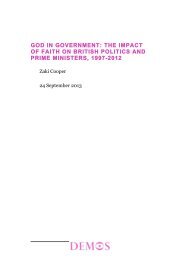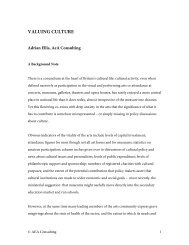Cultural diplomacy - Demos
Cultural diplomacy - Demos
Cultural diplomacy - Demos
Create successful ePaper yourself
Turn your PDF publications into a flip-book with our unique Google optimized e-Paper software.
<strong>Cultural</strong> Diplomacy<br />
sustained investment and proper coordination work. The British<br />
Museum’s (BM’s) Africa Programme, for example, began in 2003 as a<br />
three-year DCMS-funded initiative with equal in-kind support from<br />
the British Council. DCMS agreed to continue seed-corn money for<br />
two further years, allowing the initiative to leverage major funds from<br />
a private foundation. This successful multi-partner programme<br />
involves a series of events, exhibitions, debates and training initiatives<br />
in the UK and nine African countries. A total of 20 African countries<br />
are reached when collaboration with a transnational nongovernmental<br />
organisation in West Africa is taken into account. It is<br />
operationally effective and entirely congruent with long-term<br />
diplomatic and development goals. 5 Similarly, ‘China–UK:<br />
Connections through Culture’ is a £1 million initiative funded by<br />
DCMS, FCO, the British Council and Scottish Executive that ‘helps<br />
cultural organisations in both countries build and sustain strong<br />
relationships with each other, leading to increased exchange of<br />
cultural product between China and the United Kingdom’. 6 These are<br />
examples of synergy, and there are others in everyday practice not<br />
linked to high-profile programmes, such as when British Council<br />
language and education work takes place alongside exhibitions,<br />
education and capacity-building.<br />
But we need to be doing more. British cultural organisations play a<br />
vital role in cultural and foreign relations; however, much that they<br />
do is not specifically funded, there is little coordination, and there are<br />
few information resources on which they can draw. The UK’s cultural<br />
standing is materially important, both economically and in terms of<br />
international political influence, but this does not appear to be<br />
appreciated across the whole of government. We are under-investing<br />
in our cultural institutions, there are few formal mechanisms for<br />
engaging these organisations and other cultural leaders in the policymaking<br />
process, and there are many examples of missed<br />
opportunities. Our competitors are playing a much more strategic<br />
game, and we need to match or exceed their efforts if we are not to be<br />
left behind.<br />
<strong>Cultural</strong> <strong>diplomacy</strong>, which is about the quest for the tourist dollar<br />
18 <strong>Demos</strong>






